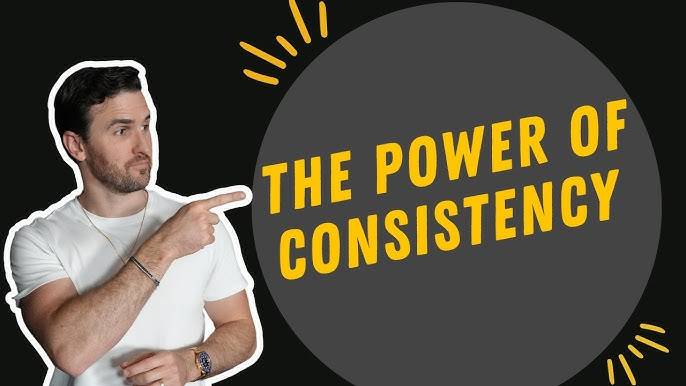The Power of Consistency: Your Key to Success
Success is often seen as a product of talent, intelligence, or even luck. While these factors play a role, the true foundation of success is consistency. Many people start with high energy and motivation but struggle to maintain momentum. The difference between those who achieve their goals and those who don’t is the ability to keep going, even when motivation fades.
In this article, we will explore the importance of consistency, how it shapes success, and practical steps to develop this powerful habit.
Why Consistency is the Key to Success
Most people have dreams and goals, but very few achieve them. Why? Because success is not about occasional effort—it’s about continuous progress. Here are some reasons why consistency is crucial:
1. Builds Discipline and Strong Habits
Motivation is temporary, but discipline lasts. When you commit to a goal and work on it daily, it becomes a habit. Habits shape your life, and your daily actions determine your long-term success.
For example, if you want to be fit, going to the gym once a month won’t help. But exercising three to four times a week will gradually build strength and endurance. The same applies to studying, saving money, or learning a skill. Small, consistent efforts lead to significant results over time.
2. Leads to Mastery and Expertise
No one becomes an expert overnight. Mastery requires years of practice and learning. Consistency allows you to improve your skills, refine your techniques, and gain deeper knowledge in your field.
Think about successful athletes, musicians, or entrepreneurs. They dedicate years to perfecting their craft. Lionel Messi didn’t become a great footballer by practicing once in a while—he trained every day. Consistency in practice leads to mastery.
3. Increases Self-Confidence
When you stick to your commitments, you build trust in yourself. Every small win reinforces the belief that you are capable of achieving your goals. This confidence grows over time and gives you the strength to take on bigger challenges.
On the other hand, inconsistency leads to self-doubt. If you constantly start and stop, you may feel like a failure. But if you keep going, even with small progress, you develop the mindset of a winner.
4. Creates Momentum and Progress
Have you ever noticed how difficult it is to start something new? But once you get into the habit, it becomes easier. That’s the power of momentum. When you stay consistent, each small effort builds on the previous one, making progress faster and more efficient.
For example, if you are writing a book, the first few pages may feel difficult. But as you write daily, ideas start flowing, and before you know it, you have written an entire book. Consistency keeps you moving forward.
5. Attracts Opportunities and Success
People notice consistency. Whether you are an entrepreneur, content creator, or professional, showing up consistently builds trust. Employers, clients, and followers prefer reliable and consistent individuals.
Imagine a YouTuber who uploads high-quality videos every week. Over time, their audience grows, and they start receiving sponsorship deals. On the other hand, a YouTuber who posts randomly struggles to build a loyal audience. Consistency opens doors to success.
How to Develop Consistency
Now that we understand the importance of consistency, how can we develop this powerful habit? Here are practical steps to help you stay on track:
1. Set Clear and Achievable Goals
Vague goals lead to vague results. Define exactly what you want to achieve. Break big goals into smaller, manageable steps. For example, instead of saying, “I want to be successful,†specify what success means to you—whether it’s starting a business, learning a skill, or improving your health.
2. Create a Routine and Stick to It
Habits are formed through repetition. Establish a daily or weekly routine that aligns with your goals. For example:
- If you want to write a book, set aside 30 minutes every day for writing.
- If you want to improve your fitness, schedule regular workouts.
- If you want to save money, set a fixed amount to save each month.
Consistency is about showing up, even when you don’t feel like it.
3. Stay Accountable
Find someone who will hold you accountable. This could be a mentor, friend, or accountability partner. Share your goals with them and update them on your progress. When you know someone is watching, you are more likely to stay committed.
4. Track Your Progress
Keep a record of your daily actions. Use a journal, planner, or an app to track your progress. Seeing how far you’ve come can be a great motivation to keep going.
5. Focus on the Process, Not Just the Outcome
Many people quit because they don’t see immediate results. But success is a journey, not a destination. Focus on daily progress rather than obsessing over quick results. Trust that small efforts will add up over time.
6. Overcome Challenges and Stay Motivated
There will be days when you feel tired, discouraged, or unmotivated. This is normal. The key is to push through those moments. Here’s how:
- Remind yourself why you started – Reconnect with your original purpose.
- Celebrate small wins – Acknowledge progress, no matter how small.
- Be kind to yourself – If you miss a day, don’t quit. Get back on track the next day.
7. Embrace Failure as Part of the Journey
Failure is not the opposite of success—it’s part of the process. Everyone experiences setbacks. The difference is that successful people learn from their failures and keep going. Instead of seeing failure as the end, use it as a lesson to improve and grow.
Real-Life Examples of Consistency Leading to Success
1. Thomas Edison – Inventor of the Light Bulb
Edison failed thousands of times before finally inventing the light bulb. When asked about his failures, he famously said, “I have not failed. I’ve just found 10,000 ways that won’t work.†His persistence and consistency led to one of the greatest inventions in history.
2. J.K. Rowling – Author of Harry Potter
Before becoming one of the best-selling authors of all time, J.K. Rowling faced numerous rejections from publishers. But she didn’t give up. She continued writing and submitting her work until she finally got published. Her consistency turned her dream into reality.
3. Cristiano Ronaldo – Football Superstar
Ronaldo is known for his relentless work ethic. Even after achieving global success, he still trains harder than most players. His consistency in training and discipline has made him one of the greatest footballers in history.
Final Thoughts
Success is not about how fast you start; it’s about how long you keep going. Consistency is what separates dreamers from achievers. No matter what your goal is—whether it’s building a business, getting fit, or mastering a skill—show up every day and put in the work.
Remember, progress may be slow, but as long as you stay consistent, you will get there. Keep pushing forward—your future self will thank you!




No comments yet
Be the first to share your thoughts!